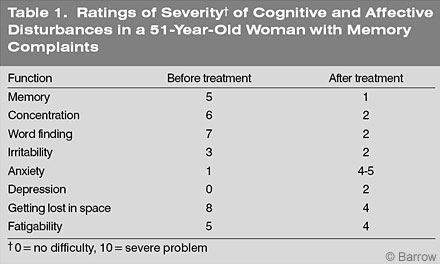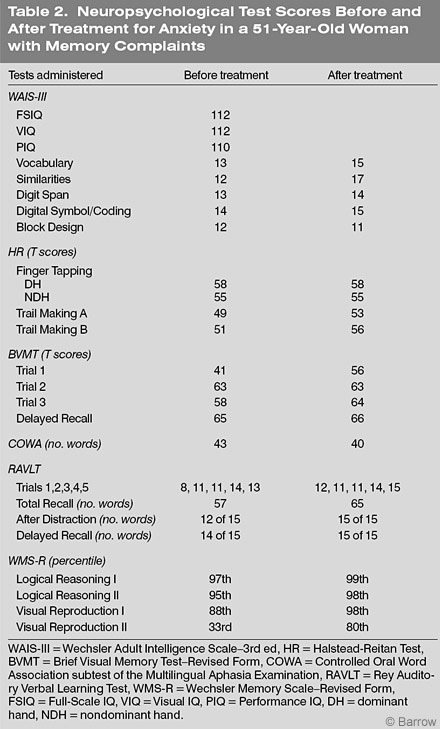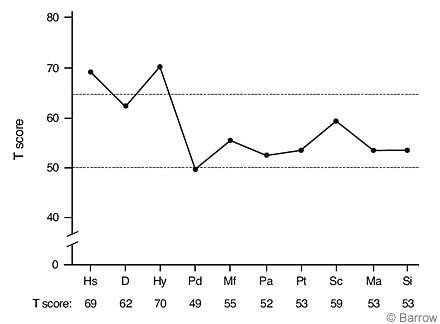
Memory and Anxiety: Neuropsychological Test Findings and Subjective Complaints in a 51-Year-Old Woman
George P. Prigatano, PhD
Camea J. Gagliardi, MEd
Division of Neurology, Barrow Neurological Institute, St. Joseph’s Hospital and Medical Center, Phoenix, Arizona
The neuropsychological status of a 51-year-old woman with memory complaints as judged to be normal. An anxiety disorder was suspected. Ratings of her cognitive and affective difficulties and her scores on neuropsychological tests were compared before and after psychiatric treatment. The results provided diagnostic information that could be helpful in cases involving such a differential diagnosis.
Key Words: anxiety, memory, neuropsychology
Abbreviations Used: IQ, intelligence quotient; MMPI-2, Minnesota Multiphasic Personality Inventory-2
Persons suffering from depression, anxiety, or both may experience diminished cognitive abilities.[1,2,6] In such individuals, memory complaints are often the impetus for a neurological consultation. Neuropsychological testing may be requested to obtain an objective description of a person’s higher cerebral functioning to help obtain a differential diagnosis. Theoretically, neuropsychological test scores should not be significantly influenced by emotional factors.[8] In clinical practice, however, some depressed and anxious patients perform below normal on various neuropsychological measures of memory. Comparisons of patients’ subjective reports about their cognitive and affective functioning to their performance on neuropsychological tests may show a pattern indicative of an early dementing condition. For example, demented patients often report better memory functioning than their relatives report about the patients.[5] Furthermore, the memory performance of demented patients is worse than that of both younger and older persons who complain of memory difficulties but who are judged to be neurologically and neuropsychologically normal.
We describe a 51-year-old woman who sought treatment for her declining cognitive status. We compared her subjective ratings of her cognitive and affective disturbances with her actual neuropsychological test scores. The patient was treated successfully for a suspected anxiety disturbance, and her clinical status had improved when she was later reexamined. Her subjective ratings and performance on neuropsychological tests, which were compared before and after treatment, provide information that may be helpful in such differential diagnoses.
Case Report
Neurological Examination
A 51-year-old, right-handed woman complained of forgetfulness during the 3 and 4 years that preceded her examination.
She reported that 6 months before her examination, her memory difficulties had clearly worsened. She told her neurologist that she frequently lost objects and had difficulty finding words. She also forgot her phone number, zip code, and husband’s last name.
The patient reported that her family history was significant for Alzheimer’s disease. Her grandfather and her mother had suffered from significant memory problems during the last 6 months of their lives, and she was understandably concerned about developing dementia.
She noted a remote history of depression that had required medication and counseling. She had smoked a half pack of cigarettes a day for 30 years but had quit about a year before seeking treatment. Ongoing hip pain had improved after treatment with celecoxib. She reported occasional nausea, headaches, and chronic bladder incontinence. At the time of her neurologic evaluation, her only medicine was Premarin (Wyeth, Madison, NJ). Otherwise, her medical history was unremarkable.
Because of her complaints, a further neurological evaluation was conducted. Her thyroid function was considered normal. Magnetic resonance imaging of the brain obtained 1 year before her neuropsychological examination was interpreted as normal. A possible vascular malformation in the anterior right temporal lobe was not confirmed. Consequently, she was referred for a
neuropsychological examination to evaluate her memory function, to help establish her differential diagnosis, and to guide her management.

Neuropsychological Examination
At her neuropsychological examination, the patient again reported that her memory difficulties had worsened in the few months preceding her examination. When interviewed in the presence of her husband, she was pleasant and cooperative. Initially, she had attributed her increased difficulties with memory to having a “busy life” and “heavy workload.” However, her memory had worsened progressively, and she was concerned that she had an undiagnosed dementing condition. She cited many examples of her memory difficulties, including buying the same book more than once and discovering that she had already read portions of a book that she was presently reading. She had watched videotapes with her husband and later forgot that she had seen them. She also noted considerable difficulties with word finding during conversations. She had a high school diploma and was working toward a Bachelor’s degree. Her employment involved information systems technology. She reported difficulties falling asleep and noted that she often had to read to “shut her thoughts out of her mind.” She fell asleep 1 to 2 hours after reading but slept only 2 to 3 hours before she would reawaken.
On a scale from 0 to 10 (with 0 meaning no difficulty and 10 a severe problem), the patient was asked to rate her level of difficulty in remembering important things on a daily basis. Using the same scale, she then rated her difficulties with concentration, word finding, irritability, anxiety, depression, getting lost in space, and fatigability (Table 1). Her initial neuropsychological examination included being administered the following tests: the BNI Screen for Higher Cerebral Functioning, the Controlled Oral Word Association subtest of the Multilingual Aphasia Examination, the Trail Making Test-Parts A and B, the Wechsler Adult Intelligence Scale-3rd Edition, the Rey Auditory Verbal Learning Test, the Brief Visual Memory Test-Revised Form, the Halstead Finger Tapping Test, portions of the Wechsler Memory Scale-Revised Form, and the MMPI-2.

Consultation and Treatment
After the initial neuropsychological examination was conducted, the test findings were reviewed with the patient (Table 2). Her IQ scores were average to above average, as was her performance on memory tasks. On only one memory test (delayed recall of visual reproduction on the Wechsler Memory Scale-Revised Form) was her performance below average, but her score was attributed to concentration difficulties. She had personally rated her concentration difficulties as slightly higher than her memory problems. She had rated word-finding difficulties and getting lost in space as areas of significant difficulties. She reported no depression and low levels of anxiety.
The examining neuropsychologist interpreted her findings to mean that her higher cerebral functions were normal. Instead, the patient appeared to be showing primary features of anxiety. Her MMPI-2 profile, which was reviewed with her in detail, indicated a 3-1 profile compatible with the clinical observations of heightened difficulties with anxiety and associated concerns about health (Fig. 1).
After that consultation, the patient discussed the need for other medications with her neurologist. She was placed on trazodone and reportedly experienced very positive effects. She was able to obtain a good night’s sleep on a regular basis. She also received counseling for anxiety and learned muscle relaxation techniques, which helped her to manage her anxiety behaviorally. Furthermore, she had voluntarily initiated a job change, returning to a previous employer with whom she found it more satisfying to work. Finally, she had undergone a gastric bypass procedure and had lost weight, thereby increasing her self-esteem.
Posttreatment Subjective Ratings and Neuropsychological Test Findings
About 9 months after the patient’s initial evaluation, she was scheduled for a follow-up neuropsychological examination. She spontaneously noted that she thought the follow-up neuropsychological examination was unnecessary because she was doing so well. However, she was willing to do so because she was pleased with the recommendations and her improved cognitive and emotional functioning.
At this examination, she was again asked to rate her symptoms in terms of difficulties with memory, concentration, word finding, irritability, anxiety, depression, getting lost in space, and fatigability (Table 1). Her ratings of cognitive impairment were substantially reduced, and she rated her anxiety level higher than she had before treatment. When questioned about this change, she stated that she now knew “what anxiety feels like.” Similar statements are often heard in clinical practice. Anxious patients may not know that they are anxious. Only when they are treated appropriately do they sense their anxiety. Her complaints about getting lost in space also decreased substantially.
Her neuropsychological test scores after treatment were strikingly similar (Table 2). The mild improvements could reflect practice effects. Her scores on delayed recall on the Visual Reproduction subtest of the Wechsler Memory Scale, however, was comparable to her other scores and IQ estimates.

Discussion
Obtaining patients’ subjective ratings of their cognitive and affective function helps clinicians to place a patient’s experiences into perspective. Younger patients who primarily have a psychiatric disorder often report more difficulties with word finding than with memory difficulties per se.[5] When this pattern is associated with the presence of normal neuropsychological functioning, a trial of psychiatric treatment for the suspected emotional difficulty should be initiated. Such treatment reduced our patient’s cognitive complaints and improved her recognition of the role anxiety may have been playing in her life.
Interestingly, at her initial presentation, she rated her word-finding difficulties higher than her memory difficulties per se. When measures of intelligence, memory, and verbal fluency are judged to be within the normal range for a given patient and there is no unusual disparity among the scores on the various measures, this pattern may be a diagnostic clue that psychiatric disorders are contributing to a patient’s symptom picture.
The emerging literature on the neuroimaging correlates of anxiety disorders helps us understand the phenomenological experience of such patients. Patients with anxiety disorders often exhibit disturbances in resting blood flow in the orbitofrontal region and anterior cingulate cortex.[7] Treatment of anxiety reduces cerebral blood flow (activation) in these areas, especially in the anterior cingulate. These regions have been implicated in a number of theories of concentration and attention.[4]
The inability to attend to information effectively and flexibly underlines complaints of word-finding difficulties and associated problems with memory. The anterior cingulate is also especially important in the ability to suppress the interfering effects of various stimuli.[3] Perhaps the memory difficulties reported in anxious patients are related to the effects of interfering stimuli on the retrieval process of new information.
Continued studies on the neuroimaging correlates of anxiety disorders may provide further information that will help explain the cognitive complaints of patients with various psychiatric disorders. However, clinical observations of patients’ complaints combined with findings on neuroimaging studies will provide the most effective interpretation of neuropsychological test performance when clinicians confront patients with a challenging differential diagnosis.
References
- Bassett SS, Folstein MF: Memory complaint, memory performance, and psychiatric diagnosis: A community study. J Geriatr Psychiatry Neurol 6:105-111, 1993
- Eysenck MW, Calvo MG: Anxiety and performance: The processing efficiency theory. Cognition and Emotion 6:409-434, 1992
- Mead LA, Mayer AR, Bobholz JA, et al: Neural basis of the Stroop interference task: Response competition or selective attention? J Int Neuropsychol Soc 8:735-742, 2002
- Mesulam MM: Principles of Behavioral and Cognitive Neurology. New York: Oxford University Press, 2000
- Prigatano GP, Borgaro SR: Neuropsychological and phenomenological correlates of persons with dementia and patients with memory complaints but no dementia. Barrow Quarterly 20(2):21-26, 2004
- Prigatano GP, Caples HS: Memory complaints and depression in a young adult: Case report. Barrow Quarterly 19(4):28-31, 2003
- Rauch SL: Neuroimaging and the neurobiology of anxiety disorders, in Davidson RJ, Scherer KR, Goldsmith HH (eds): Handbook of Affective Sciences. New York: Oxford University Press, 2003, pp 963-976
- Reitan RM, Wolfson D: Emotional disturbances and their interaction with neuropsychological deficits. Neuropsychol Rev 7:3-19, 1997
